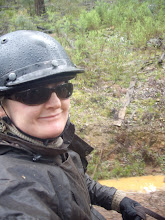 I'm always pleased when great examples of the speculative fiction genre are mentioned in mainstream press and treated with the respect they deserve, and was especially happy tonight to read on the train on way home a serious economic piece in the serious political commentary section of The Age about rampant consumerism and wealth distribution that referred to Ursula Le Guin and how she "once wrote a remarkable short story on an imaginary society called Omelas". The article then goes on to explain the setting and ethical dilemma at the heart of the famous 1973 philosophical parable that all science fiction and fantasy readers know so well.
I'm always pleased when great examples of the speculative fiction genre are mentioned in mainstream press and treated with the respect they deserve, and was especially happy tonight to read on the train on way home a serious economic piece in the serious political commentary section of The Age about rampant consumerism and wealth distribution that referred to Ursula Le Guin and how she "once wrote a remarkable short story on an imaginary society called Omelas". The article then goes on to explain the setting and ethical dilemma at the heart of the famous 1973 philosophical parable that all science fiction and fantasy readers know so well.I remember how The Ones Who Walk Away From Omelas blew the moral circuits of my mind the first time I read it. It so succinctly tells us that we each and every one of us are responsible citizens who have to make a decision about what kind of a society we want to live in, and that at some point, there's no fudging that choice - you have to face the truth about what kind of a person you are. It still gets me with that last sucker-punch of a line :
"The place they go towards is a place even less imaginable to most of us than the city of happiness. I cannot describe it at all. It is possible it does not exist. But they seem to know where they are going, the ones who walk away from Omelas."
I suppose the day that line, and indeed the whole story, stops getting to one is the day one's mind has stopped questioning injustices because it's easier and more comfortable and convenient to do so, and one's heart has hardened to the point where ingrained selfishness prompts one to habitually turn a blind eye to the sufferings of the poor and the powerless. The day this story no longer has an impact is the day when we, as individuals and as a society, have decided to stay in Omelas, a sad sad day indeed.









2 comments:
I've never read it or even heard about it. I'll have to remedy it. Was she the one who also wrote that story about the women who reached the south or north pole (the south, I think) and then realised the men who were heading there would be upset to be upstaged, so they cleaned up any mess from their visit and headed on home to cook dinner for their husbands?)
You should read it - it's only a shortie - but it probably blows one away more the younger one is when one first reads it. Tender teenage minds are appalled by the injustice of Omelas, whereas we oldies have layers of accumulated cynicism to protect us.
I'm not sure about the north pole story. Le Guin is best known for The Left Hand of Darkness, the Earthsea Quartet, the Hainish books, and a slew of short stories that are often reprinted.
Post a Comment